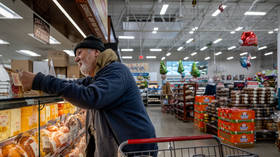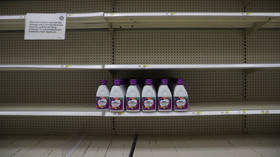Americans face ‘unprecedented’ food insecurity

More and more American families are going hungry and being forced to take such measures as watering down baby formula and skipping meals as rising grocery prices and cuts to public benefits push food insecurity to record levels, a new study has found.
The newly released survey by Propel, maker of a phone application that helps users manage their so-called “food stamp” benefits, found that a record-high 44% of respondents reported skipping meals in the past month, a 7% increase from the rate in April. The results show that food insecurity among users of the app was at “unprecedented levels” for the second straight month.
Propel’s findings illustrate how Americans who rely on the federal government’s Supplemental Nutrition Assistance Program (SNAP) are struggling to cope after 32 states began cutting benefits in March. The cuts affected more than 30 million people and came at a time when US grocery prices are about 20% higher than two years ago.
Nearly one in three survey respondents (32%) told Propel that they relied on family members or friends to give them food in the past month. Nearly half said they couldn’t afford the foods they wanted, and 54% reported that they were forced to eat less.
“We can’t afford to spend cash on food,” one app user told the firm. “Everything’s too expensive. We go to food banks, but they don't supply enough of the essential things, such as milk, bread, eggs and oil, so we go without those things until SNAP comes.”
Rising costs for other essentials, such as energy, are contributing to the food insecurity crisis, Propel said. Over 43% of survey respondents have past-due utilities or other bills, and 26% are behind on their rent or mortgage payments. About 57% of app users believe their money on hand won’t last more than a day or two, up nearly 20% from a month ago. Evictions rose by 40% from April’s level, and 11% of respondents said their utility services had been shut off in the past month.
A new study by the Greater Boston Food Bank had similar findings, including the fact that one in three families reported that their children were going hungry or that they had skipped meals. Among Massachusetts households that rely on the food bank for assistance, 70% said they had been forced to choose between buying groceries or paying utility bills. More than six in ten said they had to choose between eating and paying for medical care. About 85% said they bought the “cheapest food available” to get by.
US inflation surged to a 40-year high last summer, largely on rising food and energy prices. President Joe Biden blamed the jumps in prices on Russia’s military offensive against Ukraine.














